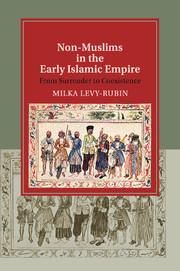Book contents
- Frontmatter
- Contents
- Illustrations
- Preface
- Introduction
- 1 The Roots and Authenticity of the Surrender Agreements in the Seventh Century
- 2 Shurūt ʿUmar and Its Alternatives
- 3 The Date and the Ideology of the Ghiyār Code
- 4 The Enforcement of Shurūt ʿUmar
- 5 The Provenance of the Modes of Subordination of Non-Muslims
- Conclusion
- Appendix I Al-Turtūshıī’s Version of Shurūt ʿUmar
- Appendix II Al-Shāfiʿıī’s Version of the Pact to Be Accorded to Non-Muslim Subjects
- Notes
- Glossary
- Bibliography
- Index
Introduction
Published online by Cambridge University Press: 05 January 2012
- Frontmatter
- Contents
- Illustrations
- Preface
- Introduction
- 1 The Roots and Authenticity of the Surrender Agreements in the Seventh Century
- 2 Shurūt ʿUmar and Its Alternatives
- 3 The Date and the Ideology of the Ghiyār Code
- 4 The Enforcement of Shurūt ʿUmar
- 5 The Provenance of the Modes of Subordination of Non-Muslims
- Conclusion
- Appendix I Al-Turtūshıī’s Version of Shurūt ʿUmar
- Appendix II Al-Shāfiʿıī’s Version of the Pact to Be Accorded to Non-Muslim Subjects
- Notes
- Glossary
- Bibliography
- Index
Summary
The seventh century in the East was a time of major turbulence and upheavals which culminated in the Muslim conquest and dominion over what had been Sasanian Iran as well as over a significant part of the Byzantine empire. When the Muslims gained their first major victories over the Byzantine forces in the fourth decade of the seventh century CE, and when in the next few decades they overtook large parts of the ancient Near East, they were but a small minority among a large and heterogeneous population, made up of various ancient peoples, ethnicities, cultures, and religions. The encounter between the new, and not yet fully formed, Muslim religion and society and these ancient societies and cultures was a momentous event for both the conquerors and the conquered, as is well attested by the contemporary sources that have survived. It raised hopes of freedom and change in some of the conquered peoples, including the Jews, the Samaritans, and the Monophysites, and generated great fear and awe in others.
While the immediate effects of the conquest seem to have been mild, according to the accepted views nowadays, and allowed life in the conquered territories to take its course, its long-lasting effects were far-reaching.
- Type
- Chapter
- Information
- Non-Muslims in the Early Islamic EmpireFrom Surrender to Coexistence, pp. 1 - 7Publisher: Cambridge University PressPrint publication year: 2011



